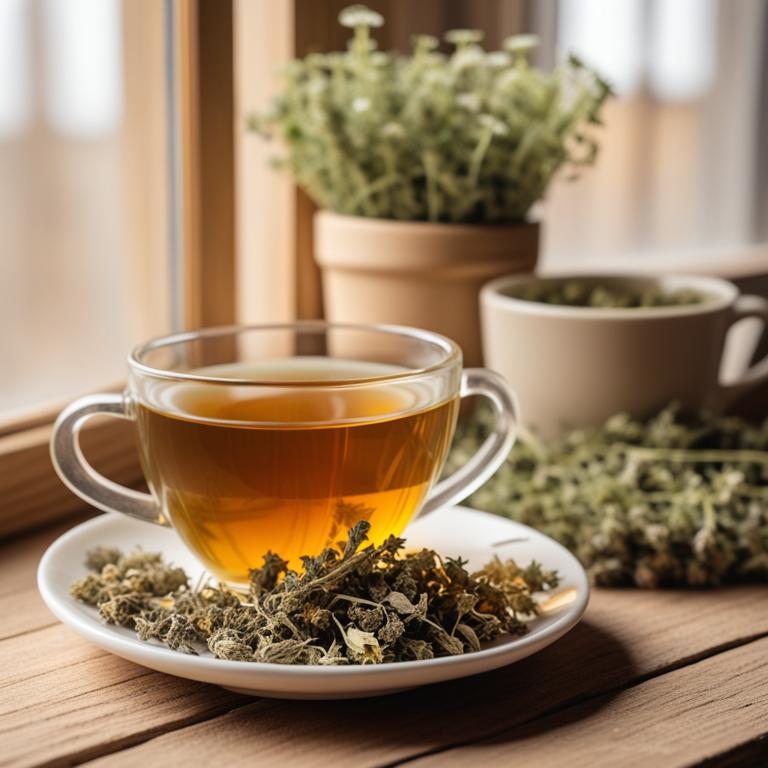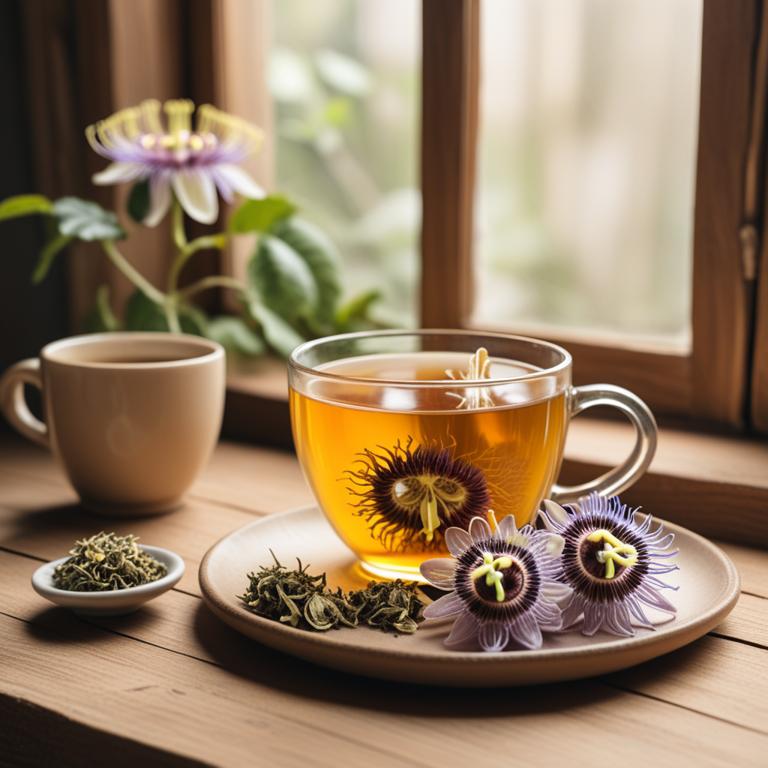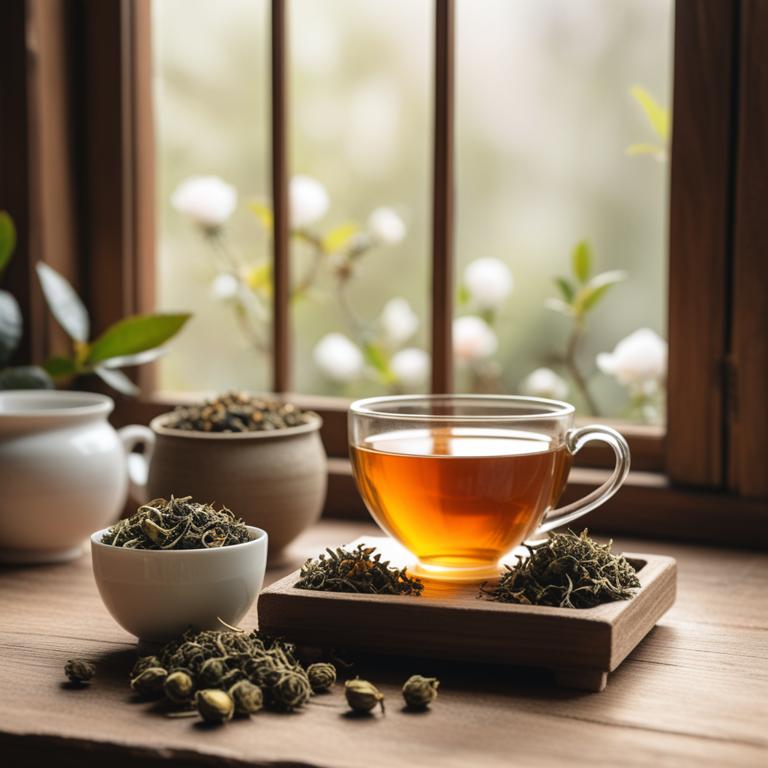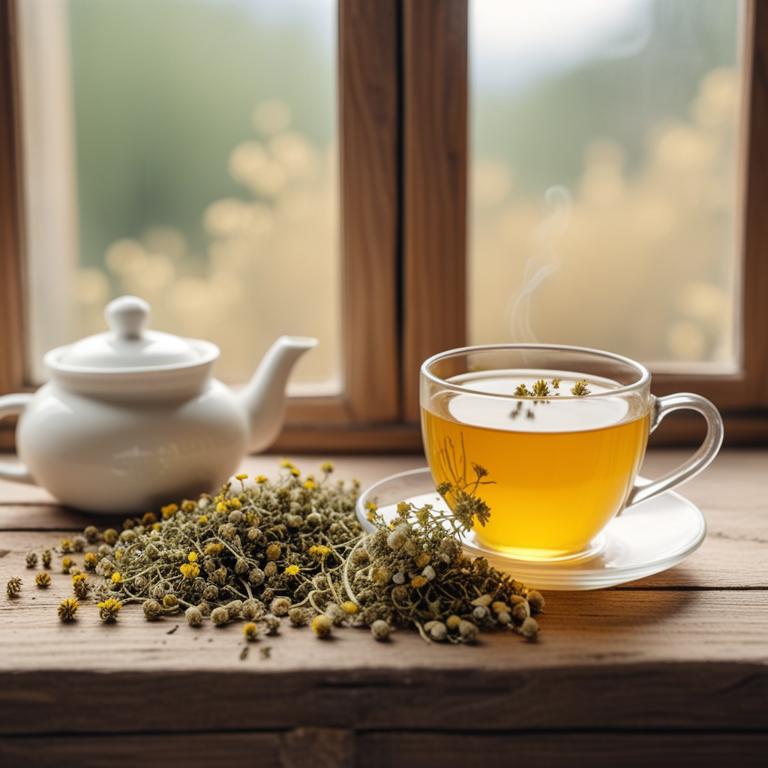13 Best Herbal Teas For Insomnia

Herbal teas for insomnia are a type of tea that helps individuals suffering from sleep disorders, characterized by difficulty initiating or maintaining sleep.
These teas offer a natural and relaxing way to unwind before bed, promoting a restful night's sleep.
Some popular examples of herbal teas used to treat insomnia include chamomile, which calms the mind and body, lavender, which reduces anxiety and stress, valerian root, which has a sedative effect, passionflower, which alleviates insomnia symptoms, and peppermint, which soothes the digestive system and promotes relaxation.
By consuming these teas, individuals can reap the benefits of improved sleep quality, reduced stress levels, and a more balanced sleep-wake cycle.
According to "Phytotherapy research : PTR", teas for insomnia may contain herbs such as Valeriana officinalis, which acts on the central nervous system to promote sedation and relaxation, thereby improving overall sleep time, reducing sleep latency, and enhancing sleep quality.
Below there's a list of the 13 best herbal teas for insomnia.
- 1. Lavandula angustifolia teas
- 2. Valeriana officinalis teas
- 3. Scutellaria lateriflora teas
- 4. Passiflora incarnata teas
- 5. Avena sativa teas
- 6. Zingiber officinale teas
- 7. Camellia sinensis teas
- 8. Corydalis ternata teas
- 9. Melissa officinalis teas
- 10. Cinnamomum verum teas
- 11. Matricaria chamomilla teas
- 12. Rosmarinus officinalis teas
- 13. Glycyrrhiza glabra teas
Also you may be interested in...
TODAY'S FREE BOUNDLE
Herb Drying Checklist + Herbal Tea Shopping List + Medicinal Herbs Flashcards
Enter you best email address below to receive this bundle (3 product valued $19.95) for FREE + exclusive access to The Aphotecary Letter.
$19.95 -> $0.00
1. Lavandula angustifolia teas

Lavandula angustifolia teas, derived from the flowers of the lavender plant, have been traditionally used to treat insomnia due to their calming and sedative properties.
The herbal preparation helps to treat insomnia by promoting relaxation, reducing anxiety and stress levels, and regulating sleep patterns.
The bioactive constituents of Lavandula angustifolia, including linalool and linalyl acetate, are responsible for its sedative and anxiolytic effects, which in turn help to improve sleep quality.
By consuming Lavandula angustifolia teas, individuals can benefit from improved sleep duration and quality, reduced symptoms of insomnia, and enhanced overall well-being.
Related Study
According to "Journal of psychopharmacology (Oxford, England)", Lavandula angustifolia teas for insomnia may be effective in conjunction with other sedative properties, such as valerian, in establishing a tranquil ambience conducive to sleep.
2. Valeriana officinalis teas

Valeriana officinalis teas, also known as valerian root tea, have been traditionally used to treat insomnia due to their sedative and relaxing properties that help individuals fall asleep and stay asleep.
The herbal preparation contains bioactive constituents such as valerenic acid, valeranone, and isovaleric acid, which act on the central nervous system to reduce anxiety and promote a state of calmness.
By promoting a restful sleep and reducing stress, Valeriana officinalis teas help to alleviate insomnia symptoms and improve overall sleep quality.
Regular consumption of valerian root tea has been shown to provide benefits such as improved sleep duration, reduced sleep latency, and enhanced daytime functioning, making it a popular natural remedy for insomnia.
Related Study
According to the study, Valeriana officinalis teas for insomnia may be associated with improvements in sleep parameters such as sleep latency and quality of sleep, particularly when used on its own or in combination with hops.
3. Scutellaria lateriflora teas

Scutellaria lateriflora teas, also known as blue skullcap, have been traditionally used to treat insomnia due to their sedative and calming properties.
The bioactive constituents present in this herbal preparation, such as baicalin and wogonin, help to promote relaxation and reduce stress levels, leading to improved sleep quality.
By reducing anxiety and promoting a sense of calm, Scutellaria lateriflora teas can help individuals fall asleep faster and stay asleep longer, alleviating symptoms of insomnia.
The benefits of using Scutellaria lateriflora teas to treat insomnia include reduced reliance on sleep aids, improved sleep quality, and enhanced overall well-being.
4. Passiflora incarnata teas

Passiflora incarnata teas have been traditionally used to treat insomnia, a common sleep disorder characterized by difficulty falling or staying asleep.
The sedative and anxiolytic properties of this herbal preparation help to calm the mind and body, promoting relaxation and reducing stress, which are often contributing factors to insomnia.
The bioactive constituents present in Passiflora incarnata teas, including flavonoids, alkaloids, and glycosides, such as passionflower flavonoids, flavopereirin, and isovitexin, have been found to have a calming effect on the nervous system, thereby alleviating insomnia symptoms.
By consuming Passiflora incarnata teas, individuals can experience improved sleep quality, reduced anxiety, and enhanced overall well-being, making it a beneficial natural remedy for treating insomnia.
Related Study
According to "Current neuropharmacology", Passiflora incarnata teas for insomnia may be beneficial due to the presence of n-butanol fractions and other natural compounds such as alkaloids, glycosides, flavonoids, saponins, and tannins, which impact benzodiazepine receptors and have hypnotic properties.
5. Avena sativa teas

Avena sativa teas have been traditionally used to treat insomnia due to their calming and sedative properties, which help to promote relaxation and improve sleep quality.
The herbal preparation contains bioactive constituents such as avenacosides, isovitexin, and vitexin, which have been shown to have a sedative and sleep-promoting effect on the body.
These constituents work by reducing stress and anxiety levels, regulating the body's sleep-wake cycle, and increasing the release of sleep-inducing hormones, ultimately leading to improved sleep duration and quality.
Regular consumption of Avena sativa teas has been found to be beneficial in alleviating insomnia symptoms, promoting better sleep, and improving overall sleep health.
Related Study
According to "The Annals of pharmacotherapy", Avena sativa teas for insomnia may be useful in alleviating mild, short-term insomnia.
6. Zingiber officinale teas

Zingiber officinale teas, also known as ginger tea, have been traditionally used to treat insomnia due to its sedative and anti-anxiety properties.
The bioactive constituents of ginger tea, including gingerols and shogaols, have been found to help relax the body and mind, promoting a restful sleep.
By reducing inflammation and anxiety, ginger tea helps to calm the nervous system and induce a deep sleep, making it an effective remedy for insomnia.
The benefits of using Zingiber officinale teas to treat insomnia include improved sleep quality, reduced stress and anxiety, and a sense of relaxation and well-being.
Related Study
According to the study, Zingiber officinale teas for insomnia were found to have some benefits in improving the quantity and quality of sleep, suggesting they could be a promising alternative therapy.
7. Camellia sinensis teas

Camellia sinensis teas, derived from the leaves of the Camellia sinensis plant, have been used for centuries to treat insomnia due to their soothing and calming properties.
The flavonoids and catechins present in these teas help to regulate sleep patterns and promote relaxation, thereby alleviating the symptoms of insomnia.
The L-theanine content in Camellia sinensis teas also contributes to its sleep-promoting effects by reducing stress levels and promoting a peaceful state of mind.
Regular consumption of Camellia sinensis teas has been shown to improve sleep quality, increase sleep duration, and enhance overall well-being, making it a popular natural remedy for insomnia sufferers.
8. Corydalis ternata teas

Corydalis ternata teas have been traditionally used to treat insomnia due to their sedative and calming properties, which help to promote relaxation and reduce stress levels.
The bioactive constituents of Corydalis ternata, including alkaloids such as tetrahydropalmatine and protopine, have been found to have a sedative effect on the central nervous system, helping to alleviate symptoms of insomnia.
By promoting a state of relaxation and reducing anxiety, Corydalis ternata teas can help individuals to fall asleep faster and maintain a restful sleep throughout the night.
The benefits of using Corydalis ternata teas to treat insomnia include improved sleep quality, reduced symptoms of anxiety and depression, and a natural and non-addictive approach to managing sleep disorders.
9. Melissa officinalis teas

Melissa officinalis teas have been traditionally used to treat insomnia due to their soothing and calming properties, which help to promote relaxation and reduce stress levels.
The bioactive constituents, including linalool and linalyl acetate, in Melissa officinalis teas contribute to their sedative effects, allowing individuals to fall asleep faster and sleep more soundly.
By promoting relaxation and reducing anxiety, Melissa officinalis teas help to alleviate insomnia symptoms and improve overall sleep quality.
Regular consumption of Melissa officinalis teas has been found to offer numerous benefits, including improved sleep patterns, reduced stress levels, and enhanced mood stabilization.
Related Study
According to "Journal of alternative and complementary medicine (New York, N.Y.)", Melissa officinalis teas for insomnia showed a significant decrease in the mean difference of Insomnia Severity Index (ISI) scores, with a decrease from 4.97 ± 4.69 to 1.60 ± 3.70 in the treatment group.
10. Cinnamomum verum teas

Cinnamomum verum teas, also known as Ceylon cinnamon, have been used for centuries to treat insomnia due to their calming and relaxing properties.
The bioactive constituents present in Cinnamomum verum teas, such as cinnamaldehyde and cinnamic acid, help to reduce stress and anxiety, promoting a good night's sleep.
These compounds have a sedative effect on the nervous system, making it easier to fall asleep and stay asleep throughout the night.
Regular consumption of Cinnamomum verum teas has been shown to improve sleep quality, reduce symptoms of insomnia, and promote a sense of relaxation and well-being.
11. Matricaria chamomilla teas

Matricaria chamomilla teas have been traditionally used to treat insomnia due to their calming and relaxing properties that help to reduce anxiety and promote a good night's sleep.
The bioactive constituents of this herbal preparation, including apigenin and luteolin, have been shown to possess sedative and anxiolytic effects, which contribute to its therapeutic benefits in treating insomnia.
The flavonoids present in Matricaria chamomilla teas, such as apigenin and luteolin, interact with the GABA receptors in the brain, leading to a calming effect and helping to regulate sleep patterns.
Regular consumption of Matricaria chamomilla teas may help to improve the quality of sleep, reduce stress and anxiety, and promote relaxation, making it a popular natural remedy for insomnia.
Related Study
According to the study "The effects of chamomile extract on sleep quality among elderly people", Matricaria chamomilla teas may be beneficial for insomnia as they can significantly improve sleep quality among elderly people.
12. Rosmarinus officinalis teas

Rosmarinus officinalis teas, also known as rosemary tea, have been traditionally used to treat insomnia due to their calming and sedative properties, which help individuals relax and fall asleep more easily.
The herbal preparation contains bioactive constituents such as camphor, borneol, and rosmarinic acid, which have been found to have a sedative effect on the nervous system, reducing anxiety and stress that can contribute to insomnia.
By promoting relaxation and reducing stress, rosemary tea helps individuals to establish a regular sleep pattern and improve the quality of their sleep.
The benefits of using rosemary tea to treat insomnia include improved sleep quality, reduced anxiety and stress, and a natural and non-invasive approach to addressing this common sleep disorder.
Related Study
According to "Environmental science and pollution research international", Rosmarinus officinalis teas for insomnia are among the herbal remedies used to treat insomnia, as reported by 25 species cited by herbalists in the north-central region of Morocco.
13. Glycyrrhiza glabra teas

Glycyrrhiza glabra teas, derived from the licorice root, have been used for centuries to treat various health issues, including insomnia.
The sedative and anti-anxiety properties of this herbal preparation help to calm the mind and body, promoting a restful sleep.
The bioactive constituents, such as glycyrrhizin, flavonoids, and saponins, work synergistically to reduce stress and anxiety, thereby helping to treat insomnia.
Regular consumption of Glycyrrhiza glabra teas has been shown to improve sleep quality, reduce sleep latency, and increase the duration of deep sleep, providing relief from insomnia and related symptoms.